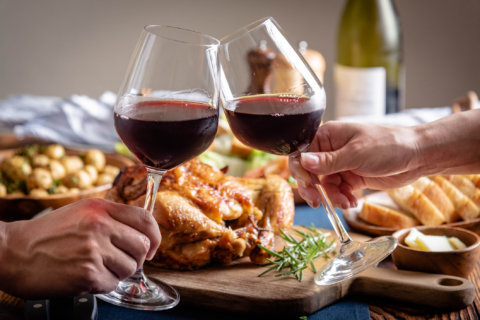A great slice of turkey is delicious. It’s juicy; it’s filled with flavor, and it needs no gravy or anything of the sort. Yet lots of people will be eating dry turkey this Thanksgiving, and it doesn’t have to be that way.
“Everyone hates a dry Thanksgiving turkey,” said Drew Darneille, who owns Smokecraft Modern BBQ, in Clarendon. “Turkey is super temperamental.”
So before Thursday comes, make sure you prepare a brine to soak your bird in at least a day or two before Thanksgiving. Darneille suggests about an hour per pound, at least.
“You can buy a brine packet at the grocery store and mix it with water,” he said, if you want to go the easy route. You can also make your own, using salt, sugar and the seasonings of your choice, such as sage, rosemary, tarragon and other seasonings. But feel free to experiment.
“You can do something with apple cider, some cinnamon, some oranges. You can put a little bourbon in there,” said Darneille. “You can do a lot of fun things with brine to try and get some flavor into that bird that’s going to be positive, that’s going to accentuate the turkey.”
(You could use lemon and honey too — just saying. Now, back to the experts.)
While most chefs will back Darneille when it comes to brining, it’s not a universally held opinion. Rob Sonderman, who runs the Federalist Pig restaurants in Adams Morgan and Hyattsville, prefers to use dry rubs and closely watch how everything cooks.
“I think really the main reason to use a brine is, yes, to kind of add some moisture to the bird. But really the only thing that you need that for is if you’re planning on overcooking your turkey, which is what we’re not going to do,” said Sonderman.
“Overcooking your turkey is the main reason why your mom’s turkey has always been dry,” Sonderman added. He pointed out that usually the thermometer added into the thick part of the turkey doesn’t pop until the temperature hits 185 to 190 degrees. That ends up cooking the juices right out, so use your own thermometer instead and aim for 165 degrees.
When he’s smoking turkey, Darneille pulls the turkey out at around 155 and lets it rest, knowing the bird will keep cooking on the inside.
“By pulling it out with that breast at 155, the carry-over heat is going to take it to that perfect 165 level,” said Darneille. “If you go too far, that’s when your meat begins to dry out. If you pull it at 155 and just kind of tent it and let it just sit there for that 30 minutes, 45 minutes before you’re ready to serve it, that internal temperature will get you where you want to go.”
Sonderman agreed, saying that if you wrap up the turkey in some foil and allow it to “rest” you’ll be able to let the juices settle inside while it finishes cooking internally. He recommends resting it as long as an hour or two.
“If you have guests coming over at 3 or 4, you want your turkey out of the oven at 1 or 2 at the latest,” said Sonderman. “Worst comes to worst you can pop it back in the oven for five minutes to warm it back up or maybe put it in the oven on a broil setting for five minutes to crisp the skin back up.”
Roasted turkey is traditional, and fried turkey has gained in popularity, but Darneille is, obviously, a big fan of smoking his turkey. If you smoke with charcoal, he advised using lump charcoal, not your traditional briquettes, and use woods such as apple or maple, which are milder than other types.
And while traditional BBQ might be a low-and-slow style of cooking in general, in this case you want to crank up the heat and cook things faster (sorry if you’re looking for a reason to stay outside and away from the in-laws).
“When you’re talking a turkey, you want to go a little hotter and a little faster,” said Darneille. “The low-and-slow can dry that bird out, so you’re trying to get it cooked without losing all your moisture. I cook our turkeys around 275 degrees.”
Both recommend spatchcocking it — “basically cutting the backbone out and laying it flat,” is how Darneille described it. “That will help it cook a lot more evenly, a lot faster, and be a much juicier bird.”
Sonderman said that applies to anyone roasting their turkey in the oven too.
“It allows for more even cooking,” said Sonderman. “It’s just a more efficient way. It speeds the cooking process up and allows for more even cooking.”
Darneille added that if you want a good, crispy skin, even out of the smoker, just use cooking spray or liquid butter and spray it on the outside.
And if you’re frying your turkey this year? Then forget everything we said about a brine. It doesn’t apply.
“Usually there’s a lot of sugar in brines and if that sugar kind of absorbs into the skin it’s going to be black really fast if you’re deep frying,” said Sonderman. He suggests injecting the meat ahead of time instead, maybe using butter.








